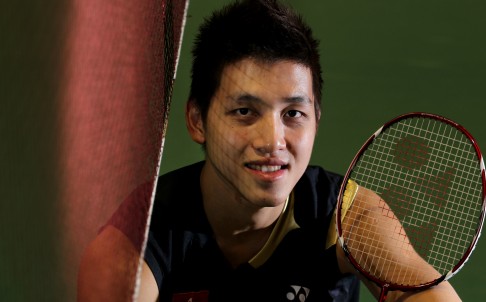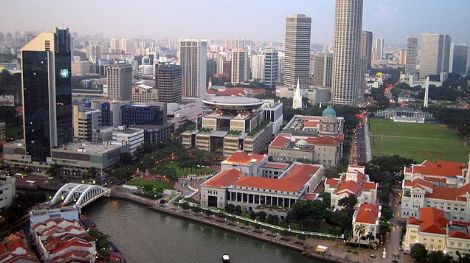When sepak takraw first appeared at the 1967 Southeast Asian Games in Bangkok, its appearance was a watershed moment – the first time an event codified in the region had appeared at the games. The sport has only ever been missing from the international competition once since its introduction, when it was overlooked for the program of the 1971 Games in Kuala Lumpur.
Where does it originate?
Many countries around the region lay claim to the invention of this sport. One of the most popular arguments is that it developed from the circle game common to Myanmar and known as chinlone. Popular opinion also suggests that a similar game may have been introduced to the area by Chinese travellers. Whether based on chinlone, the Chinese game of cuju, or a third option, in 1829, the Siam Sports Federation codified the game and a new identity was born. In 1833, the addition of a net created the game you will see in December.
What’s it all about?
Sometimes called “kick volleyball”, the alternative name provides a reasonable impression of what you’ll see. Sepak takraw is also a pretty accurate name, derived as it is from the Malay word sepak, “to strike with foot” and the Thai word takraw, meaning “ball” or “basket”. This name is more relevant to the game as one of the events included within the 2013 program is the hoop event, where the net is replaced by a hoop suspended above the court and one team with no opposition attempts to place the ball through the hoop using a variety of different styles.
How do you play?
The predominant version of the game uses a net and is played on a court of 13.4 by 6.1 metres (44 ft × 20 ft), very similar in size to a doubles badminton court. On each side of the net you’ll see a small circle drawn on the court, this is the service spot. There is also a semi- circle drawn at each end of the centre line. This creates two-quarter circles on each side of the net.
Traditionally made from woven rattan, nowadays the balls are often completed with synthetic fibres. The balls should have 12 holes, 20 intersections and measure at least 17 inches in circumference.
First service will be decided by the flip of a coin. From there on in the winners of the last set have the option of choosing who will serve. To serve, one player will stand in the quarter circle and throw the ball to his teammate who is standing at the service circle. That player will then kick the ball across the net and into play. Each team serves three times in a row before the opposition takes its turn.
Now in play, the players have three touches to pass the ball between them using their head and feet before returning the ball to the opposition. If the ball hits the floor, doesn’t make it over the net or is kicked out of the court then the point is over. Once a team reaches 21 points they have won the set, unless the score is tied on 20 points each, in which case the game will continue until 25 points.
How do you win?
In order to win the best of three sets game you’ll need to develop all manner of specialised kicks. The most difficult and most effective form of serve is nicknamed the “horse kick”.
In order to develop a competitive advantage players have developed several styles of smashes or spikes to make any response from the opposition difficult. Many of the top players have their own unique take on moves such as the “Sunback Spike”. This particularly aggressive form of attack has seen the ball travelling toward opponents at speeds in excess of 120km/h. A team scores a point when the opposing team fails to return the ball across the net within the 3 ‘touches’ rule, or the ball is returned across the net but lands outside of the court.
What should you be saying?
Killer: A common usage to describe the Spiker or a successful spike ball.
Regu: A Malaysian word meaning a team. A team comprising of four players; three starters and one reserve is known as a regu, a squad of three regus is known as a Team.
Roll Spike: When a player jumps with his back to the net, rotates in the air and kicks the ball over the opposite shoulder from the kicking foot. It is these dramatic and gymnastic abilities that make sepak takraw such an exciting sport to watch.
Where is it played?
The people of Southeast Asia have taken this sport to the world. The International Sepak Takraw Federation (ITSAF) now represents federations in 32 countries across the world. From Iran to the USA and from Switzerland to Bangladesh they now play this game. As well as the Southeast Asian Games, the sport has appeared in the Asian Games since 1990. It was also introduced as a demonstration sport when Chinese Taipei held the 2009 World Games, an event that features sports recognised by the International Olympic Committee but not played at the Olympics.
How many medals are available?
With five events for men and five events for women, that leaves 10 gold medals to be contested in Takraw. Both genders will compete in the hoop event, regu, double regu, team and double team events.
What’s the betting?
This is a sport where Myanmar will really look to capitalise on home advantage. In 2011 the Women’s double regu secured a gold medal and across the six events three other teams secured medals. With additional gold up for grabs and home fans cheering the sides on they’ll be looking to challenge the traditional dominance of the Thai sides in this sport.
Where will it all happen?
The sepak takraw will be hosted at the Wunna Theikdi Stadium in Nay Pyi Taw. It will start with the hoop event on December 10 and continue with the other competitions until December 21.
Matt Roebuck is a sports writer and sports development consultant based in Yangon. He is the author of the book The Other Olympics, published in 2012.













